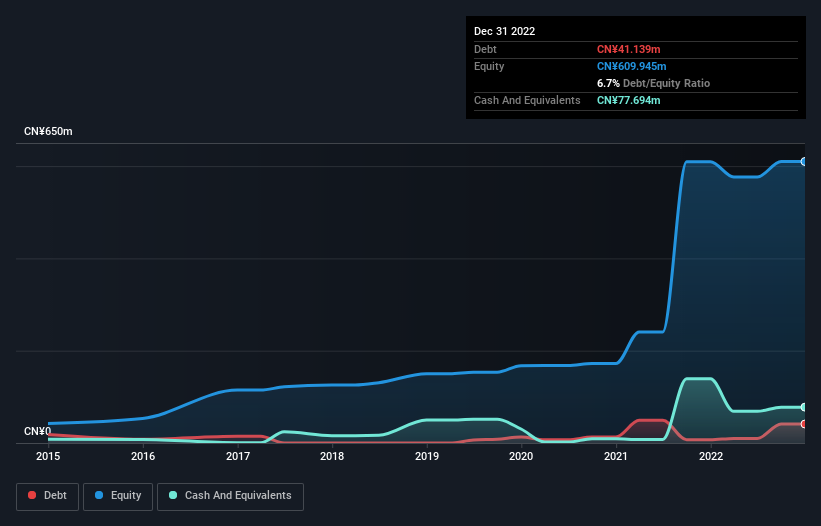Warren Buffett famously said, 'Volatility is far from synonymous with risk.' So it seems the smart money knows that debt - which is usually involved in bankruptcies - is a very important factor, when you assess how risky a company is. As with many other companies HG Semiconductor Limited (HKG:6908) makes use of debt. But is this debt a concern to shareholders?
Why Does Debt Bring Risk?
Debt assists a business until the business has trouble paying it off, either with new capital or with free cash flow. If things get really bad, the lenders can take control of the business. However, a more frequent (but still costly) occurrence is where a company must issue shares at bargain-basement prices, permanently diluting shareholders, just to shore up its balance sheet. Having said that, the most common situation is where a company manages its debt reasonably well - and to its own advantage. When we think about a company's use of debt, we first look at cash and debt together.
See our latest analysis for HG Semiconductor
What Is HG Semiconductor's Debt?
As you can see below, at the end of December 2022, HG Semiconductor had CN¥41.1m of debt, up from CN¥7.00m a year ago. Click the image for more detail. However, it does have CN¥77.7m in cash offsetting this, leading to net cash of CN¥36.6m.

How Healthy Is HG Semiconductor's Balance Sheet?
We can see from the most recent balance sheet that HG Semiconductor had liabilities of CN¥97.2m falling due within a year, and liabilities of CN¥11.2m due beyond that. On the other hand, it had cash of CN¥77.7m and CN¥110.5m worth of receivables due within a year. So it can boast CN¥79.8m more liquid assets than total liabilities.
This surplus suggests that HG Semiconductor has a conservative balance sheet, and could probably eliminate its debt without much difficulty. Simply put, the fact that HG Semiconductor has more cash than debt is arguably a good indication that it can manage its debt safely. When analysing debt levels, the balance sheet is the obvious place to start. But you can't view debt in total isolation; since HG Semiconductor will need earnings to service that debt. So if you're keen to discover more about its earnings, it might be worth checking out this graph of its long term earnings trend.
Over 12 months, HG Semiconductor made a loss at the EBIT level, and saw its revenue drop to CN¥88m, which is a fall of 31%. That makes us nervous, to say the least.
So How Risky Is HG Semiconductor?
We have no doubt that loss making companies are, in general, riskier than profitable ones. And we do note that HG Semiconductor had an earnings before interest and tax (EBIT) loss, over the last year. Indeed, in that time it burnt through CN¥164m of cash and made a loss of CN¥101m. With only CN¥36.6m on the balance sheet, it would appear that its going to need to raise capital again soon. Even though its balance sheet seems sufficiently liquid, debt always makes us a little nervous if a company doesn't produce free cash flow regularly. When analysing debt levels, the balance sheet is the obvious place to start. But ultimately, every company can contain risks that exist outside of the balance sheet. Case in point: We've spotted 4 warning signs for HG Semiconductor you should be aware of, and 3 of them can't be ignored.
At the end of the day, it's often better to focus on companies that are free from net debt. You can access our special list of such companies (all with a track record of profit growth). It's free.
Valuation is complex, but we're here to simplify it.
Discover if HG Semiconductor might be undervalued or overvalued with our detailed analysis, featuring fair value estimates, potential risks, dividends, insider trades, and its financial condition.
Access Free AnalysisHave feedback on this article? Concerned about the content? Get in touch with us directly. Alternatively, email editorial-team (at) simplywallst.com.
This article by Simply Wall St is general in nature. We provide commentary based on historical data and analyst forecasts only using an unbiased methodology and our articles are not intended to be financial advice. It does not constitute a recommendation to buy or sell any stock, and does not take account of your objectives, or your financial situation. We aim to bring you long-term focused analysis driven by fundamental data. Note that our analysis may not factor in the latest price-sensitive company announcements or qualitative material. Simply Wall St has no position in any stocks mentioned.
About SEHK:6908
HG Semiconductor
An investment holding company, designs, develops, manufactures, and sells semiconductor products in the People’s Republic of China.
Adequate balance sheet with slight risk.
Market Insights
Community Narratives



